Nooltetan is a Maasai peasant farmer who has been unable to farm because of the severe East African drought.
Mostly, she has depended on raising cattle for her family’s survival. In the past 10 to 20 years the Tanzanian government has encouraged Maasai pastoral communities to engage in alternative work such as farming instead of just relying on cattle.
Nooltetan heeded this call. Along with raising cattle, she began farming her small plot of land when she got married. But the drought has been severe, forcing Nooltetan to cease her attempts at farming. Then she lost all of her cattle and was reduced to poverty.
Nooltetan and her husband had two children before they separated after family quarrels. Now she looks after her children on her own.
With children to feed and responsibilities to fulfill. Nooltetan resorted to collecting firewood for a living. Each day she goes to the nearby bush to collect firewood, which she carries to the nearby town to sell.
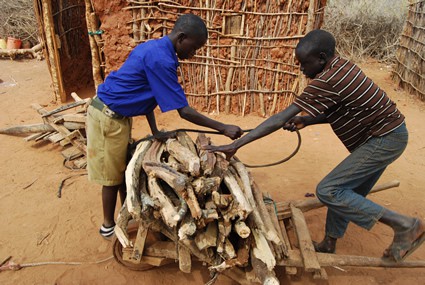
One day Nooltetan injured herself with her machete, which has forced her to rely on her 15-year-old son, Alais, to collect firewood and sell it to feed the family. Nooltetan tells us,
“We get about Tshs 2,000 per day (approx. $1.15 USD) for the bundle of firewood we sell and then we use the money to buy food and other home essentials.”
Nooltetan feels it is better to do that than go hungry with no food at all. When the family is not able to earn a living through selling firewood, or when Alais has not been able to secure a day’s pay, the family resorts to asking a neighbor for food.
But if the neighbor family has nothing to spare, Nooltetan’s family goes hungry that day.
After her separation from her husband, Nooltetan decided to go back to her parents where she was born. While there she met a man who fathered four more children with her. This man has not married her and doesn’t take any responsibility for the children.
So Nooltetan now has six children to raise. Before the drought, she had six cows and 10 goats, but now she doesn’t have so much as a chicken to supply eggs and income.
“This year the drought has persisted and because of the loss of our cows and goats, the situation has become even more difficult.
“We depended much on the cattle as our security and means of survival, because we could sell some and buy food. But since cattle are no longer available, we depend on the small business of collecting firewood in exchange for food.”
On a good day, Nooltetan’s family has two simple meals of maize flour and beans, vegetables or porridge. Today they had porridge in the morning and they were going to have another porridge meal in the evening.
The porridge is made of water with maize flour and smallest measure of cooking oil they can buy (at Tshs 200, approximately 15 cents USD) to add flavor.
Food scarcity is not the only the problem in this community; there is also an acute shortage of water. Even though a water pipe is located a few hundred meters from Nooltetan’s home, the pipe is dry most of the time.
The only reliable source of water is a puddle of water-pipe leakage. Here, many people from the community collect their water each day. When the puddle is dry, they have to walk several kilometers to look for water.
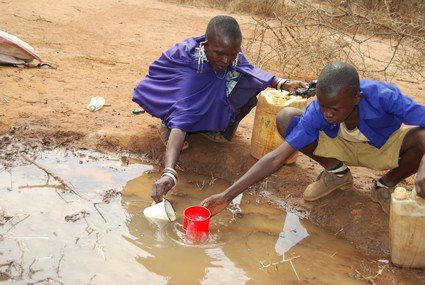
One day a relative heard that the local church, in partnership with Compassion International, was going to register children and help support them. Knowing Nooltetan’s struggles to raise six children as a single mother, the uncle asked the child development center workers if he could register her son Emmanuel.
The development center workers came to Nooltetan’s home and confirmed Emmanuel for registration. Nooltetan says she has seen God in these workers, and in Emmanuel.
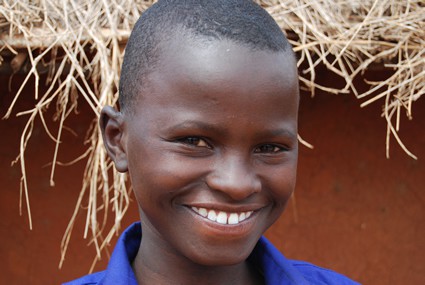
“Emmanuel being registered has benefited us as [a] family in many ways. Emmanuel would not have gone to school if it was not for Compassion’s intervention. His behavior is very different compared to his other siblings, and more importantly, he has great hope for the future.
“The impact [of] him going to school has even touched his younger siblings, who all go to school as opposed to his elder brothers who did not go to school.”
The family has also received several gifts from Emmanuel’s sponsors, who have even been in their home to visit them.
“These gifts have helped our family to buy food and clothes for other children as well. The benefits have spanned to all other family members.”
Nooltetan cannot hide her joy and her appreciation of Emmanuel’s sponsors.
“I would like to sincerely thank Emmanuel’s sponsors for their support and I thank God who touched them to choose sponsoring my child. I would also tell them if it were not for them, our story, and particularly that of Emmanuel, would be very different.”


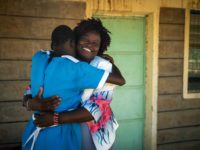
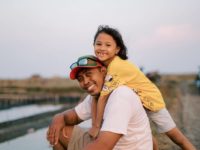
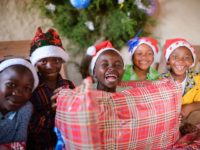


3 Comments |Add a comment
great blog, thank you and keep it up!
It’s amazing how sponsoring a child impacts the whole family and community for good.
Family gifts give the family such an amazing boost! I often wonder how many prayers are answered when we send child, birthday, family and project gifts to places on the other side of the world.
Thank you, Charles, for sharing more insights into the challenges of daily life in Tanzania. I have several children there and I love to read of Compassion’s impact in the communities. I always enjoy reading your posts!!